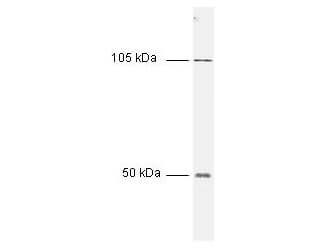Datasheet is currently unavailable. Try again or CONTACT US
NFkB p105 Antibody
Rabbit Polyclonal
100-4184
100 µL
Liquid (sterile filtered)
Human
Rabbit
Shipping info:
$50.00 to US & $70.00 to Canada for most products. Final costs are calculated at checkout.
Product Details
Anti-NFKB p105 (RABBIT) Antibody - 100-4184
rabbit anti-NFkB p105 Antibody, NFKB, nfkb, NF-kB, NF-kappaB, NFkappaB
Rabbit
Polyclonal
Antiserum
Target Details
NFKB1 - View All NFKB1 Products
Human
Conjugated Peptide
Human NFkB p105 peptide corresponding to a region near the N-terminus of the human protein conjugated to Keyhole Limpet Hemocyanin (KLH).
This product was prepared from monospecific antiserum by delipidation and defibrination. Anti-Human NFkB p105 may react non-specifically with other proteins.
Application Details
This product was assayed by immunoblot and found to be reactive against Human NFkB p105 at a dilution of 1:1000 followed by reaction with Peroxidase conjugated Affinity Purified anti-Rabbit IgG [H&L] (Goat) code #611-1302. See also Rockland Immunochemical's anti-Human NFkB p50 (NFKB1), which is suitable for the detection by immunoblot of both human NFkB p50 (NFKB1) and its precursor protein p105.
Formulation
90 mg/mL by Refractometry
None
0.01% (w/v) Sodium Azide
None
Shipping & Handling
Dry Ice
Store vial at -20° C prior to opening. Aliquot contents and freeze at -20° C or below for extended storage. Avoid cycles of freezing and thawing. Centrifuge product if not completely clear after standing at room temperature. This product is stable for several weeks at 4° C as an undiluted liquid. Dilute only prior to immediate use.
Expiration date is one (1) year from date of receipt.
NFkB was originally identified as a factor that binds to the immunoglobulin kappa light chain enhancer in B cells. It was subsequently found in non-B cells in an inactive cytoplasmic form consisting of NFkB bound to IkB. NFkB was originally identified as a heterodimeric DNA binding protein complex consisting of p65 (RelA) and p50 (NFKB1) subunits. Other identified subunits include p52 (NFKB2), c-Rel, and RelB. The p65, cRel, and RelB subunits are responsible for transactivation. The p50 and p52 subunits possess DNA binding activity but limited ability to transactivate. p52 has been reported to form transcriptionally active heterodimers with the NFkB subunit p65, similar to p50/p65 heterodimers. Both p50 and p52 are synthesized in a precursor form referred to as p105 and p100, respectively. The heterodimers of p52/p65 and p50/p65 are regulated by physical inactivation in the cytoplasm by an inhibitor called IkB-a. IkB-a binds to the p65 subunit, preventing nuclear localization and DNA binding. Low levels of p52 and p50 homodimers can also exist in cells. Reports describe the 607 aa C-terminal region (CTR) of p105 as IkB-g in that the molecule acts as an inhibitor of NFkB by binding to p65 and other NFkB subunits. p105 contains an N-terminal p50 domain followed by a glycine rich region (GRR), ankyrin repeat domain (ARD), death domain (DD) and destruction box (DB).
This product is for research use only and is not intended for therapeutic or diagnostic applications. Please contact a technical service representative for more information. All products of animal origin manufactured by Rockland Immunochemicals are derived from starting materials of North American origin. Collection was performed in United States Department of Agriculture (USDA) inspected facilities and all materials have been inspected and certified to be free of disease and suitable for exportation. All properties listed are typical characteristics and are not specifications. All suggestions and data are offered in good faith but without guarantee as conditions and methods of use of our products are beyond our control. All claims must be made within 30 days following the date of delivery. The prospective user must determine the suitability of our materials before adopting them on a commercial scale. Suggested uses of our products are not recommendations to use our products in violation of any patent or as a license under any patent of Rockland Immunochemicals, Inc. If you require a commercial license to use this material and do not have one, then return this material, unopened to: Rockland Inc., P.O. BOX 5199, Limerick, Pennsylvania, USA.

